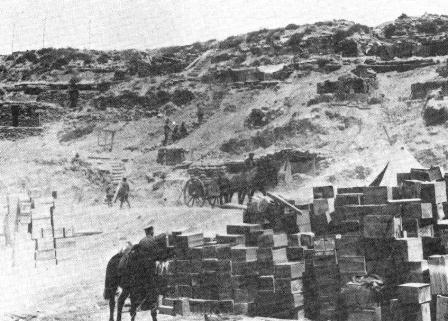06 January 1916
HELLES - It is nice to turn back to one of the stalwarts of the Gallipoli campaign. Captain John Gillam had been there from start to finish. Under fire most days as shells crashed down randomly on W Beach he had survived and would indeed survive the war. Now he found himself - as at the start almost alone.

"A lovely calm morning. The shelling has quietened down considerably. I think the Monitors have been frightening the Turkish gunners somewhat. Also Asia is not worrying us, thank God ! and yesterday's bombardment from the cruiser has probably done a lot of good. The sea is like glass, and the conditions are perfect for evacuation. The same policy is being followed in getting the last troops off on 'Z; night as was followed at Suvla, but quantities of material, ordnance, and Royal Engineer stores will have to be left. The reserve ammunition in the keeps on the beaches on the last night will be blown up just before we leave. Enemy aeroplanes are over in the morning, showing great daring and keeping our airmen very busy. The beaches are crowded with mules, wagons, and fatigue parties hard at work at loading the lighters. There is no attempt at concealing what we are doing. But the Turk does not know which night is our last, and if we can manage to keep him in ignorance, then we can get off the last night without a rearguard action being fought, for John Turk does not like leaping over the top. Our Monitors, destroyers, and two cruisers keep the Turkish artillery much quieter than they were a few days ago, though at intervals they give us a very bad time on the beaches. A large number of personnel go off, including the 29th Division Train with all their animals. Only myself, the Adjutant, and one or two other officers and a handful of men are left to stand by in case the last day is delayed and troops require food. At present, all on shore are rationed up to next Tuesday night. All the Greeks have left." (Captain John Gillam, Army Service Corps, 29th Divisional Supply Train, Helles)
Soon everyone would be gone. But could they get away with it?
SOURCE:
J. Gillam, "Gallipoli Diary", (Stevenage, The Strong Oak Press, 1989), pp.317-318
